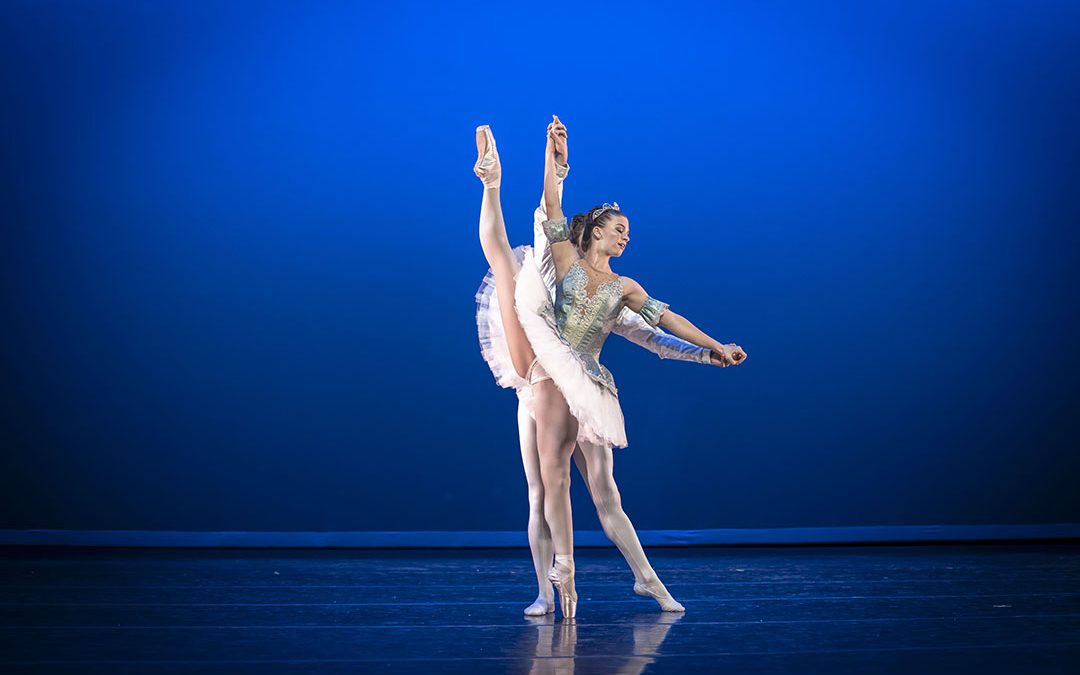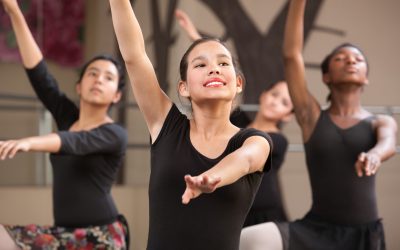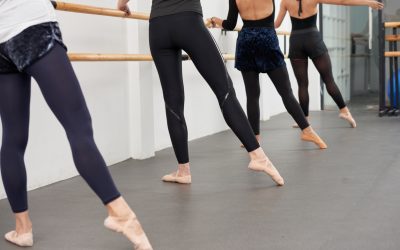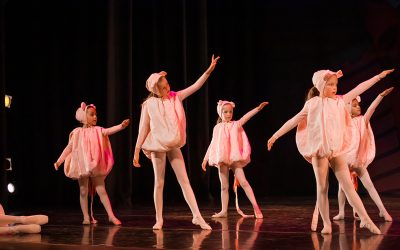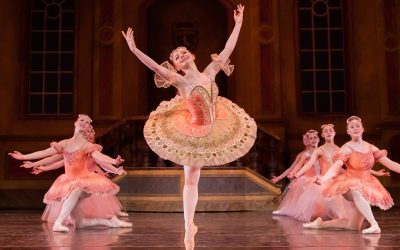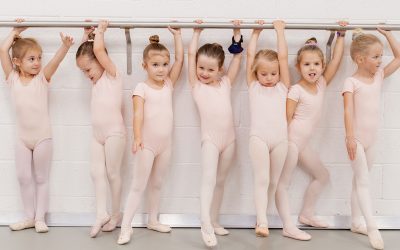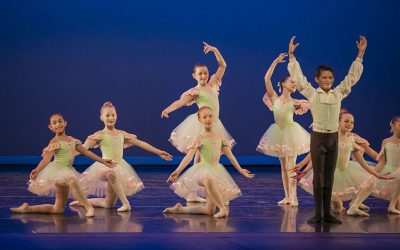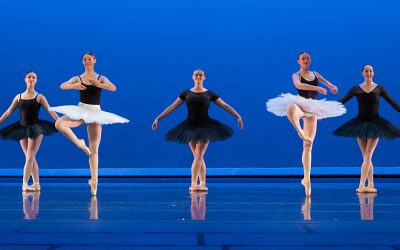A pre-professional ballet program is a ballet program that helps prepare aspiring ballerinas for semi-professional ballet opportunities. This includes auditioning for scholarships or college/university dance programs as well as professional dance companies.
A pre-professional ballet program helps dancers master and polish their ballet technique and augment their ballet skills with additional styles of dance, health and fitness, and professional skills such as writing resumes or having a successful audition.
What do Dancers Do in Pre-Professional Ballet Programs?
A pre-professional ballet program typically includes dance instruction, supplemental skills, and company dance.
Ballet Technique
For a pre-professional ballet company, ballet technique will be a large part of what you learn and master. You will most likely study classical ballet and advanced skills, including pointe, and master all the advanced techniques you will need to know for a professional or university company.
Supplemental Dance
Many pre-professional ballet programs also include supplemental dance instruction. This is important because it helps strengthen knowledge, fitness, and capabilities. It makes dancers more well-rounded. It also helps them to be able to draw from other ballet techniques that may inspire some choreographers, such as modern or flamenco.
Fitness & Health
Some pre-professional dance programs also include fitness and health instruction. This usually consists of workshops that bring in experts to talk about things like a healthy diet, conditioning, or stress management to maintain health during a ballet career.
Conditioning
In addition to dance, many pre-professional programs include conditioning classes, which focus on overall fitness. Conditioning classes include aerobic and strength workouts that help the body prepare for and withstand training and rehearsals.
Choreography
Many pre-professional ballet programs also include training in choreography. This is where dancers learn how to choreograph and stage solo and group productions. While many dancers may not go on to choreograph professional pieces, the knowledge learned during this training can help strengthen the ability to learn and understand choreography and strengthen solo pieces.
Professional Skills
In addition to training and technique, dancers also often have workshops for professional skills such as auditioning and writing a resume. They may fake headshots, polish their bios or resumes, and practice interviews to help them in their career or educational pursuits.
Company Dance
A pre-professional program is typically part of a dance company. These dancers work together through training and workshops while also applying their skills in group pieces and performances. This helps ballerinas have real-life dance company experience and performance opportunities to apply their skills and further build their resume.
Why Participate in a Pre-Professional Ballet Program?
One of the main reasons to participate in a pre-professional ballet program is to master essential technical dance skills. Professional and academic ballet programs are high competition, taking the best dancers from around the world.
A pre-professional program allows ballerinas to polish and master dance technique to increase their ability to achieve these opportunities.
These programs are specifically designed by professionals in the ballet industry who have “been there, done that.” Not only are they an excellent source of essential training for future ballet careers, but they are also a great place to network and make professional connections.
Many professional companies or university programs have connections with pre-professional ballet programs or instructors and view these programs as “incubators” for more advanced programs and companies.
In addition to essential professional connections, dancers benefit from accessing a wide variety of dance experts from a number of different companies and programs. This means insights into which program the dancer may want to pursue as well as information about what types of skills or experience that program may look for.
About Central Utah Ballet’s Pre-Professional Program
Central Utah Ballet has created a pre-professional ballet program to simulate a college and professional ballet experience. Each student will train in classical ballet technique, contemporary, modern, flamenco, character, classical ballet repertoire, learn vintage re-staged classical ballets, experience the creative process of diverse choreographers, and perform in live performances.
About the Author

Jennie Creer-King
Owner & Artistic Director
Jennie Creer-King is the owner and artistic director of Central Utah Ballet Academy. She is an award-winning dancer, instructor, and choreographer. Among her awards include “Best School Award” by the Youth American Grand Prix, “Best of State” in Choreography and Youth Performing Group, and the Presidential Scholar’s Teacher Recognition Award. Jennie has a Bachelor's Degree from the University of Utah School of Dance with an emphasis in Ballet Performance and a Master's Degree from the University of Utah School of Dance emphasis in teaching pedagogy and choreography.
You may also be interested in...
5 Reasons You Should Take Adult Ballet Classes
As adults, it can be difficult to prioritize the things we love–especially when we have a family whose interests seem to trump our own. However, with self-care growing in the spotlight, the need to make time for our passions is being looked upon as less of a luxury...
FAQs About Central Utah Ballet’s Children’s Dance Programs
Central Utah Ballet offers ballet classes for children 3+. For toddler and preschool students ages 3-5, explore our pre-ballet classes. For students 6+, please take a look at our children’s ballet classes. Below are some frequently asked questions about our program....
About Adult Ballet Classes at Central Utah Ballet
Central Utah Ballet is proud to offer ballet dance classes for adults at our studio in Lehi, Utah. As dancers ourselves, we know that passion for ballet doesn’t diminish with age. Our ballet classes give adult dancers an opportunity to fuel their passion. What Adult...
What do Kids Learn in Toddler Ballet Classes?
Three or four years old may seem early to start a child in ballet, but there are many new skills a child will learn in these classes. 5 Things Children Learn in Toddler Ballet Classes There are many reasons parents enroll their toddlers in toddler ballet classes....
Can You Take Private Ballet Lessons?
There are many reasons dancers may be interested in private ballet lessons. They may be aspiring dancers who seek to improve their skills and technique. They may be preparing for an opportunity such as a solo, audition, or scholarship opportunity. They may even be...
What Kind of Dance Lessons are Best for a 3-Year-Old?
From hip-hop, tap or creative movement, the options for starting your child in dance classes are endless. If the goal is to give them a few hours to get out their jitters, then perhaps what you sign them up for doesn’t matter. However, if the dream is for your cherub...
Should I Put My Son in Ballet?
If you have a son interested in ballet, you might have wondered if you should enroll him in ballet lessons. Though supporting our children in their passions should be intuitive, it does not mean that parents don’t worry about the implications of certain choices. Will...
What is a Trainee in Ballet?
If you are an aspiring ballet dancer, you may have heard other dancers talking about ballet trainee programs. But what, exactly, is a trainee in ballet and what should you look for in trainee programs? We answer these questions below. What is a Trainee in Ballet? A...
At What Age Can Toddlers Start Ballet?
What Age Can Toddlers Start Ballet? Toddlers can start ballet as early as 3 years old. However, most ballet studios will require that the child is potty trained. These early toddler classes will typically be shorter than ballet classes for older children, usually...

